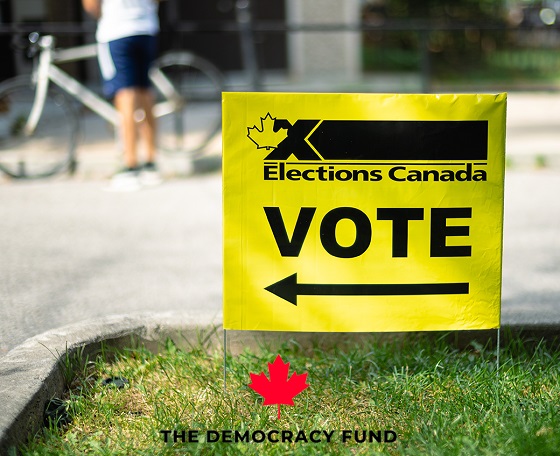Alberta
TDF expresses concern over Election Canada’s new mis/disinformation policy

From The Democracy Fund

Written by TDF’s Legal Team
The Democracy Fund sends a letter to Elections Canada and Minister LeBlanc.
Elections Canada has recently developed a policy to monitor and dissuade the publication of “misinformation” and “disinformation.”
In January 2024, it launched its ElectoFacts website to provide “correct information about elections that Canadians can easily access.” Elections Canada claims that it does not intend to establish Elections Canada as “the arbiter of truth” that will actively monitor the accuracy of statements and information distributed by parties and candidates.
However, The Democracy Fund (TDF) fears that the ambiguous language and the apparent lack of legislative authority to engage in such an endeavour will lead to an expansion of the program. Elections Canada has also contacted social media companies to remove “inaccurate” information: this is troubling because it is arguably an infringement of free speech rights, and there appears to be no judicial oversight of this censorship.
Canadians have the right to criticize their government and its processes – even if this criticism is wrong, inapt, trivial, unfair or unjustified. Efforts by the Western governments to constrain criticism using fashionable terms such as “misinformation” or “disinformation” are just state censorship rebranded for modern audiences.
TDF outlined its concerns in a letter to the Office of the Chief Electoral Officer and the Minister of Public Safety, Democratic Institutions and Intergovernmental Affairs, Dominic LeBlanc.
Our letter is attached below.
February 9, 2024
via email
Stéphane Perrault
Acting Chief Electoral Officer
Office of the Chief Electoral Officer
Elections Canada
30 Victoria Street
Gatineau, Quebec
K1A 0M6
Dear Mr. Perrault,
Re: Elections Canada Misinformation/Disinformation Monitoring
We are a civil society organization and registered charity that defends and promotes civil liberties in Canada. We are writing to express our concerns regarding comments around election “misinformation” and “disinformation” on the Elections Integrity and 1 ElectoFacts website.2
On its Election Integrity website, under “Disinformation or Influence Campaign,” Elections Canada outlines several types of objectionable conduct, namely:
- Elections Canada: Influence campaigns aimed at discrediting parts of the electoral process.
- Political Parties/Candidates: Social media campaign to spread false information about a candidate.
- Electors: Foreign online campaign aimed at specific diaspora communities to influence their vote.
In addition, Elections Canada purports to monitor the “information environment” (the news media, the Web, social media, etc.) to detect:
- Incidents that could affect the smooth administration of a general election or by-election;
- Inaccurate information on the electoral process, which could prevent people from exercising their rights to register, vote or be a candidate; and,
- Social media accounts and websites that impersonate Elections Canada, which could lead to confusion.3
We note that Elections Canada has previously contacted social media companies – including Facebook, Twitter, Google, Snapchat, LinkedIn, Reddit, YouTube, TikTok, and Instagram:
- Elections Canada (EC) engages with digital platforms that have a significant Canadian presence as well as those that have reached out to EC.
- For the 44th general election (GE44), EC worked with Facebook/Instagram, Google/YouTube, Twitter, LinkedIn, Snapchat, and for the first time, TikTok and Reddit, to establish protocols for reporting cases of false information on the voting process and impersonation of EC.4
The purpose of this contact was to report online content to these platforms and, presumably, have them remove “false information.” This was done without prior judicial oversight and review.
There are a number of problems with this approach to monitoring online information.
First, it is not clear that Elections Canada has the legislative authority to report citizens or their online comments, or attempt to influence platforms to remove “false information.” Even if it did, doing so without judicial review and oversight is arguably improper.5 Where there was authority to regulate “false statements” in the Canada Elections Act6 (“the Act”), we note that the court, in Constitution Foundation v. Canada (Attorney General), held that s.91(1) of the Act breached s.2(b) of the Canadian Charter or Rights 7 and Freedoms.8
Importantly, the legality of prohibiting the publication of “false news” has been adjudicated by Canadian courts, and the relevant Criminal Code provisions have been 9 struck down.10
Second, the ability to identify “misinformation” and “disinformation” requires resolution of one of the most difficult problems in epistemology. Simply put, an assessment of the truth of a statement engages the central questions of epistemology: what is meant by the claim that a statement is true, and under what authoritative conditions can one be certain that a statement is true (“the Epistemic Problem”). This Epistemic Problem has bedeviled philosophers for millennia, and remains unresolved. Until such time as it is resolved, claims to epistemic certainty are unfounded.
There is no evidence that Elections Canada has resolved the Epistemic Problem. It cannot, therefore, arrogate to itself the required certainty on matters of truth or falsehood.
Third, we note that the language used by Elections Canada regarding “false information” is ambiguous. Linguistic ambiguity allows for expansive regulatory powers. Further, the language used does not allow for “false information” that is comedic, parodistic or satirical. As a result, removal or attempted removal of “false information” will be overbroad and imprecise.
Fourth, given the concerns outlined above, it is not clear that Elections Canada could implement any process that would be better at ascertaining truth than citizens using normal human discernment.
Consequently, any removal or attempted removal of “false information” will be an exercise in either arbitrary or politically-motivated censorship. This is particularly troubling because the type of “false information” that attracts attention usually relates to contested or controversial political and moral statements, rather than trivial falsehoods.
Worse still, in our experience, punishment for contravening speech laws is typically inflicted upon minority communities, vulnerable groups and political dissidents: those with privilege avoid sanction.
Finally, attempts to remove “false information” will ultimately result in the erosion of civil liberties and democratic engagement. The reduction in exposure to moral and political information – both true and false – prevents citizens from engaging with complex arguments, and, thereby, diminishes their critical-thinking capacity. For, if the information expressed was correct, participants would have gained the benefit of exchanging their wrong information for correct information. If the information expressed
was wrong, participants would have gained the benefit of intellectual justification for their beliefs, without which they possess not knowledge, but dead dogma.11
For these reasons, we would respectfully recommend that Elections Canada restrict its conduct to publishing factual information about elections and the electoral process. It is safer and more practicable for the citizens as Canada to remain the arbiters of truth.
As always, we would be pleased to meet with you to discuss our concerns and any questions you may have about our position.
Regards,
Mark A. Joseph
Senior Litigation Counsel
c.c.: Minister of Public Safety, Democratic Institutions and Intergovernmental Affairs
- Election Integrity and Security Including Foreign Interference
- ElectoFacts
- Supra, note 1.
- Agreements with social media platforms to address inaccurate information
- Little Sisters Book and Art Emporium v. Canada (Minister of Justice), [2000] 2 SCR 1120
- Canada Elections Act, S.C. 2000, c. 9
- Constitution Foundation v. Canada (Attorney General), 2021 ONSC 1224
- Canadian Charter of Rights and Freedoms, s.7, Part 1 of the Constitution Act, 1982, being Schedule B to the Canada Act 1982 (UK), 1982, c 11 a
- Criminal Code, RSC , 1985, c. C-46
- R. v. Zundel, [1992] 2 SCR 731
- Chicago. Mill, John Stuart. 2002. On Liberty. Dover Thrift Editions. Mineola, NY: Dover Publications.
About The Democracy Fund:
Founded in 2021, The Democracy Fund (TDF) is a Canadian charity dedicated to constitutional rights, advancing education and relieving poverty. TDF promotes constitutional rights through litigation and public education. TDF supports an access to justice initiative for Canadians whose civil liberties have been infringed by the government lockdowns and other public policy responses to the pandemic.
Alberta
Petition threatens independent school funding in Alberta

From the Fraser Institute
Recently, amid the backdrop of a teacher strike, an Alberta high school teacher began collecting signatures for a petition to end government funding of independent schools in the province. If she gets enough people to sign—10 per cent of the number of Albertans who voted in the last provincial election—Elections Alberta will consider launching a referendum about the issue.
In other words, the critical funding many Alberta families rely on for their children’s educational needs may be in jeopardy.
In Alberta, the provincial government partially funds independent schools and charter schools. The Alberta Teachers’ Association (ATA), whose members are currently on strike, opposes government funding of independent and charter schools.
But kids are not one-size-fits-all, and schools should reflect that reality, particularly in light of today’s increasing classroom complexity where different kids have different needs. Unlike government-run public schools, independent schools and charter schools have the flexibility to innovate and find creative ways to help students thrive.
And things aren’t going very well for all kids or teachers in government-run pubic school classrooms. According to the ATA, 93 per cent of teachers report encountering some form of aggression or violence at school, most often from students. Additionally, 85 per cent of unionized teachers face an increase in cognitive, social/emotional and behavioural issues in their classrooms. In 2020, one-quarter of students in Edmonton’s government-run public schools were just learning English, and immigration to Canada—and Alberta especially—has exploded since then. It’s not easy to teach a classroom of kids where a significant proportion do not speak English, many have learning disabilities or exceptional needs, and a few have severe behavioural problems.
Not surprisingly, demand for independent schools in Alberta is growing because many of these schools are designed for students with special needs, Autism, severe learning disabilities and ADHD. Some independent schools cater to students just learning English while others offer cultural focuses, expanded outdoor time, gifted learning and much more.
Which takes us back to the new petition—yet the latest attempt to defund independent schools in Alberta.
Wealthy families will always have school choice. But if the Alberta government wants low-income and middle-class kids to have the ability to access schools that fit them, too, it’s crucial to maintain—or better yet, increase—its support for independent and charter schools.
Consider a fictional Alberta family: the Millers. Their daughter, Lucy, is struggling at her local government-run public school. Her reading is below grade level and she’s being bullied. It’s affecting her self-esteem, her sleep and her overall wellbeing. The Millers pay their taxes. They don’t take vacations, they rent, and they haven’t upgraded their cars in many years. They can’t afford to pay full tuition for Lucy to attend an independent school that offers the approach to education she needs to succeed. However, because the Alberta government partially funds independent schools—which essentially means a portion of the Miller family’s tax dollars follow Lucy to the school of their choice—they’re able to afford the tuition.
The familiar refrain from opponents is that taxpayers shouldn’t pay for independent school tuition. But in fact, if you’re concerned about taxpayers, you should encourage school choice. If Lucy attends a government-run public school, taxpayers pay 100 per cent of her education costs. But if she attends an independent or charter school, taxpayers only pay a portion of the costs while her parents pay the rest. That’s why research shows that school choice saves tax dollars.
If you’re a parent with a child in a government-run public school in Alberta, you now must deal with another teacher strike. If you have a child in an independent or charter school, however, it’s business as usual. If Albertans are ever asked to vote on whether or not to end government funding for independent schools, they should remember that students are the most important stakeholder in education. And providing parents more choices in education is the solution, not the problem.
Alberta
Busting five myths about the Alberta oil sands

Construction of an oil sands SAGD production well pad in northern Alberta. Photo supplied to the Canadian Energy Centre
From the Canadian Energy Centre
The facts about one of Canada’s biggest industries
Alberta’s oil sands sector is one of Canada’s most important industries — and also one of its most misunderstood.
Here are five common myths, and the facts behind them.
Myth: Oil sands emissions are unchecked

Steam generators at a SAGD oil sands production site in northern Alberta. Photo courtesy Cenovus Energy
Reality: Oil sands emissions are strictly regulated and monitored. Producers are making improvements through innovation and efficiency.
The sector’s average emissions per barrel – already on par with the average oil consumed in the United States, according to S&P Global – continue to go down.
The province reports that oil sands emissions per barrel declined by 26 per cent per barrel from 2012 to 2023. At the same time, production increased by 96 per cent.
Analysts with S&P Global call this a “structural change” for the industry where production growth is beginning to rise faster than emissions growth.
The firm continues to anticipate a decrease in total oil sands emissions within the next few years.
The Pathways Alliance — companies representing about 95 per cent of oil sands activity — aims to significantly cut emissions from production through a major carbon capture and storage (CCS) project and other innovations.
Myth: There is no demand for oil sands production

Expanded export capacity at the Trans Mountain Westridge Terminal. Photo courtesy Trans Mountain Corporation
Reality: Demand for Canadian oil – which primarily comes from the oil sands – is strong and rising.
Today, America imports more than 80 per cent more oil from Canada than it did in 2010, according to the U.S. Energy Information Administration (EIA).
New global customers also now have access to Canadian oil thanks to the opening of the Trans Mountain pipeline expansion in 2024.
Exports to countries outside the U.S. increased by 180 per cent since the project went into service, reaching a record 525,000 barrels per day in July 2025, according to the Canada Energy Regulator.
The world’s appetite for oil keeps growing — and it’s not stopping anytime soon.
According to the latest EIA projections, the world will consume about 120 million barrels per day of oil and petroleum liquids in 2050, up from about 104 million barrels per day today.
Myth: Oil sands projects cost too much
Reality: Operating oil sands projects deliver some of the lowest-cost oil in North America, according to Enverus Intelligence Research.
Unlike U.S. shale plays, oil sands production is a long-life, low-decline “manufacturing” process without the treadmill of ongoing investment in new drilling, according to BMO Capital Markets.
Vast oil sands reserves support mining projects with no drilling, and the standard SAGD drilling method involves about 60 per cent fewer wells than the average shale play, BMO says.
After initial investment, Enverus says oil sands projects typically break even at less than US$50 per barrel WTI.
Myth: Indigenous communities don’t support the oil sands

Chief Greg Desjarlais of Frog Lake First Nation signs an agreement in September 2022 whereby 23 First Nations and Métis communities in Alberta acquired an 11.57 per cent ownership interest in seven Enbridge-operated oil sands pipelines for approximately $1 billion. Photo courtesy Enbridge
Reality: Indigenous communities play an important role in the oil sands sector through community agreements, business contracts and, increasingly, project equity ownership.
Oil sands producers spent an average of $1.8 billion per year with 180 Indigenous-affiliated vendors between 2021 and 2023, according to the Canadian Association of Petroleum Producers.
Indigenous communities are now owners of key projects that support the oil sands, including Suncor Energy’s East Tank Farm (49 per cent owned by two communities); the Northern Courier pipeline system (14 per cent owned by eight communities); and the Athabasca Trunkline, seven operating Enbridge oil sands pipelines (~12 per cent owned by 23 communities).
These partnerships strengthen Indigenous communities with long-term revenue, helping build economic reconciliation.
Myth: Oil sands development only benefits people in Alberta
Reality: Oil sands development benefits Canadians across the country through reliable energy supply, jobs, taxes and government revenues that help pay for services like roads, schools and hospitals.
The sector has contributed approximately $1 trillion to the Canadian economy over the past 25 years, according to analysis by the Macdonald-Laurier Institute (MLI).
That reflects total direct spending — including capital investment, operating costs, taxes and royalties — not profits or dividends for shareholders.
More than 2,300 companies outside of Alberta have had direct business with the oilsands, including over 1,300 in Ontario and almost 600 in Quebec, MLI said.
Energy products are by far Canada’s largest export, representing $196 billion, or about one-quarter of Canada’s total trade in 2024, according to Statistics Canada.
Led by the oil sands, Canada’s energy sector directly or indirectly employs more than 445,000 people across the country, according to Natural Resources Canada.
-

 Business4 hours ago
Business4 hours agoQuebecers want feds to focus on illegal gun smuggling not gun confiscation
-

 Energy1 day ago
Energy1 day agoMinus Forty and the Myth of Easy Energy
-

 Uncategorized24 hours ago
Uncategorized24 hours agoNew report warns WHO health rules erode Canada’s democracy and Charter rights
-

 Business4 hours ago
Business4 hours agoEmission regulations harm Canadians in exchange for no environmental benefit
-

 Business1 day ago
Business1 day agoUS government buys stakes in two Canadian mining companies
-

 Crime22 hours ago
Crime22 hours agoFrance stunned after thieves loot Louvre of Napoleon’s crown jewels
-

 Frontier Centre for Public Policy2 days ago
Frontier Centre for Public Policy2 days agoOttawa Should Think Twice Before Taxing Churches
-

 Alberta1 day ago
Alberta1 day agoBusting five myths about the Alberta oil sands









